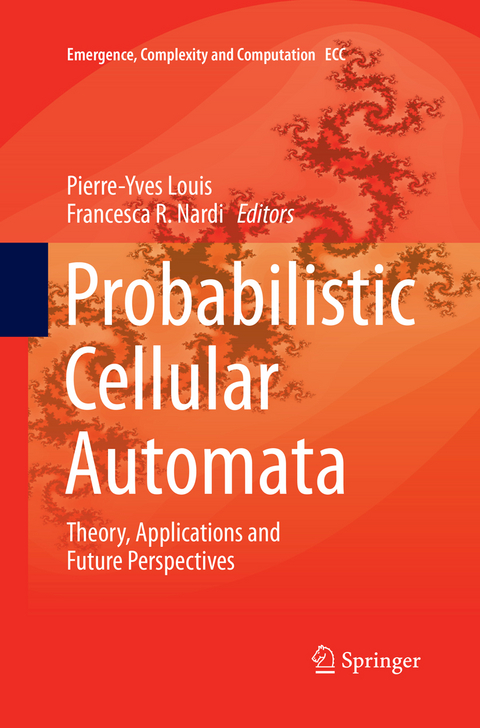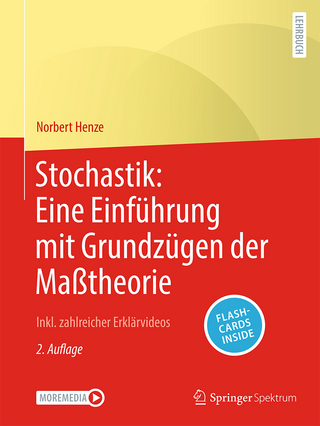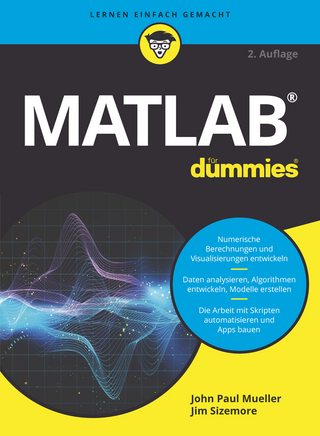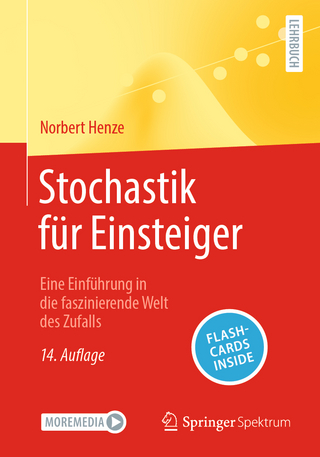
Probabilistic Cellular Automata
Springer International Publishing (Verlag)
978-3-030-09742-4 (ISBN)
Pierre-Yves Louis is an associate professor at the 'Laboratoire de Mathématiques et Applications' (University of Poitiers and CNRS, UMR 7348, France), where he teaches applied probability, statistics and stochastic modeling. His research interests include interacting systems of stochastic processes and algorithms, and stochastic models from mathematical, statistical, computational and applied perspectives (in particular in biology and medicine). He holds a PhD in mathematics from Université Lille 1 (France) and Politecnico di Milano (Italy), and his dissertation focused on a study of probabilistic cellular automata from a stochastic processes and statistical mechanics viewpoint. He previously served as an assistant at the University of Potsdam and post-doc fellow at the TU Berlin (Germany). He was trained both in pure mathematics and physics at the University Lille 1. While he was visiting scholar at Eurandom (TU Eindhoven and CNRS-UMI 3022), he was main organizer of a workshop dedicated to PCA. P.-Y. Louis is a regularly invited researcher in the Netherlands, Germany and Italy, where he maintains several ongoing research collaborations. He supervises master students and PhD candidates. Francesca R. Nardi is an associate professor at the University of Florence's Department of Mathematics and Computer Science since 2016. Previously, she had a tenure track position (2006-2016) in the Stochastics Section of the Department of Mathematics and Computer Science at Eindhoven University of Technology (the Netherlands). She received her MSc degree (1995) and PhD degree (2001) in mathematics from the University of Rome "Tor Vergata", Italy, and subsequently held post-doc and teaching positions at Eurandom (Eindhoven University of Technology, 2000-2003), the University of Rome "La Sapienza" (2003-2005), and the University of Rome "Roma tre" (2005-2006). Her main research interests are in probability theory, statistical mechanics, and mathematical physics. Applications that motivate her research are statistical physics of equilibrium: phase diagrams and phase transitions; the statistical physics of non-equilibrium: meta-stability; the spread of epidemics over networks for moving populations; random walks in random environments; cut-off phenomena and random graphs. Francesca was the recipient (as PI) of a STAR grant (2011) and an Aspasia grant (2011) from the Netherlands Organization for Scientific Research (NWO). Francesca is regularly visiting The Netherlands where she has several ongoing projects and research collaboration. Francesca has more than 15 years experience teaching courses in basic probability, stochastic processes, large deviations , metastability and random graphs. She supervised and coached master students, PhD students and post docs.
Preface.- Acknowledgements.- 1 Overview: PCA models and issues.- 2 Probabilistic Cellular Automata in Art.- Part I Probability and statistical mechanics.- 3 Basic ideas to approach metastability in Probabilistic Cellular Automata.- 4 Strategic Interaction in Interacting Particle Systems.- 5 Scaling and inverse scaling in anisotropic bootstrap percolation.- 6 The sandpile cellular automaton.- 7 Ising Model on the Torus and PCA Dynamics: reversibility, irreversibility, and fast tunneling.- 8 Synchronization in Interacting Reinforced Stochastic Processes.- 9 Nonequilibrium physics aspects of Probabilistic Cellular Automata.- Part II Computer science and discrete dynamical systems.- 10 An example of computation of the density of ones in Probabilistic Cellular Automata by direct recursion.- 11 Statistical equilibrium in deterministic Cellular Automata.- 12 Epidemic automaton and the Eden model: various aspects of robustness.- 13 Convergence time of Probabilistic Cellular Automata on the torus.- 14 Percolation operators and related models.- 15 Phase transitions of Cellular Automata.- Part III Applications to natural sciences and computational (cell) biology.- 16 A trade-off between simplicity and robustness? Illustration on a lattice-gas model of swarming.- 17 PCA modelling of multi-species cell clusters: ganglion development in the gastrointestinal nervous system.- 18 Cellular Potts model: applications to vasculogenesis and angiogenesis.- 19 Cellular Potts Models for interacting cell populations: mathematical foundation, challenges and future prospects.- 20 Cellular Automata for clouds and convection.- Participants of the 2013 Eindhoven meeting.
| Erscheinungsdatum | 05.03.2022 |
|---|---|
| Reihe/Serie | Emergence, Complexity and Computation |
| Zusatzinfo | XVIII, 344 p. 89 illus., 67 illus. in color. |
| Verlagsort | Cham |
| Sprache | englisch |
| Maße | 155 x 235 mm |
| Gewicht | 557 g |
| Themenwelt | Mathematik / Informatik ► Mathematik ► Wahrscheinlichkeit / Kombinatorik |
| Schlagworte | agent-based modelling • bootstrap percolation • Complexity • Complex Systems • crisis propagation • decentralised computational systems • density classiffication • Dynamical Systems • emergence of collective behaviour • equilibrium and non-equilibrium statistical mechan • equilibrium and non-equilibrium statistical mechanics • finite range and mean field interactions • high-dimensional interacting stochastic systems • individual-based stochastic models • metastability • multiscale models • phase transition • Reaction-diffusion • resilience to asynchronism • Self-Organisation • synchronous/asynchronous updating |
| ISBN-10 | 3-030-09742-0 / 3030097420 |
| ISBN-13 | 978-3-030-09742-4 / 9783030097424 |
| Zustand | Neuware |
| Haben Sie eine Frage zum Produkt? |
aus dem Bereich


